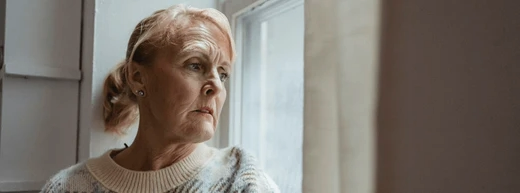There has been a real push in recent years to destigmatise mental health issues. This has been really helpful for the younger generation. However, we sometimes forget about the impact poor mental health can have on the elderly. There are many aspects of growing older that can make people feel isolated. In honour of World Mental Health Day, we wanted to share the signs to look out for to prevent elderly suicide.
Suicide is the biggest killer of men under 50. Although the rate of male suicide declines slowly between the ages of 44 to 64 years old, after this it begins to rise again. In fact, according to the official government suicide prevention strategy, “rates of suicide in men aged over 75 remain high.” However, suicide and mental health awareness campaigns often fail to mention older people at all.
Elderly Suicide: Risk Factors
While anybody can be a victim of suicide, there are a few groups of people who might be more likely to struggle with their mental health. Firstly, we’ll look at some of these risk factors for elderly suicide:
Gender
The majority of suicide victims worldwide are male. In fact, men accounted for three quarters of UK deaths by suicide in 2018. Many people point to the expectations society places on men: to be “strong” and not to admit when they feel vulnerable.
Health Concerns
As we get older, we become more prone to several significant health conditions. Illness – whether physical or mental – can be very distressing, often leading to feelings of anxiety or depression. Meanwhile, issues like poor eyesight can interfere with one’s ability to be social. This can cause an elderly person to feel isolated, which increases their risk of mental health problems.
In addition, physical ailments often lead to a reduction in independence. This is one of the biggest adjustments many of us have to make as we age. People value the feeling of control and independence. If we start having issues with mobility or grip, for example, we might begin to struggle with tasks like cooking and cleaning. Even when friends and family are on hand to help, this can be a difficult transition.
Sudden Life/Role Changes
Lots of people look forward to retirement, a chance to put their feet up at long last. However, leaving work can be a drastic change, especially if a person finds they need to stop working suddenly due to injury or ill health. Naturally, this can have damaging effects on mental health and wellbeing.
Similarly, bereavement can also be a risk factor. The loss of a loved one is never easy to cope with, but older people in particular might struggle to adjust to life without a spouse or partner, for example.
Warning Signs of Suicide
When it comes to suicide prevention, it’s absolutely essential to recognise the warning signs that somebody may be feeling suicidal. These warning signs will naturally vary from person to person, depending on gender, age, health and a whole host of other factors.
Here are some of the warning signs to look out for:
Putting affairs in order
If your loved one is rushing to complete wills or other documents relevant to end of life, this could be a sign that they are having suicidal thoughts.
Giving away belongings
Suicidal people will often begin to give away their belongings. This may include things they consider extremely special and you may be surprised they have given it away.
Talking about or threatening suicide
If your loved one has begun to talk more about feelings of hopelessness and wanting to end things, this is a clear warning sign for suicidal thoughts. One of the key characteristics of elderly suicide is feeling like a burden.
Withdrawing from friends, family, hobbies
Changes in behaviour can indicate that someone might be having suicidal thoughts. If an older person stops showing an interest in the people and things they usually enjoy, this could be a warning sign.
Dangerous or reckless behaviour
Another big warning sign of elderly suicide is misuse of medication, alcohol, or other substances. Changes in behaviour, especially when they involve risk-taking, can indicate that someone is no longer concerned about their own safety.
What Should I Do?
If your loved one is in immediate danger call 999. They may be able to take further actions such as sectioning under the Mental Health Act to keep them safe while they organise appropriate care.
If you’re having suicidal thoughts, help is available. Call the Samaritans for free on 116 123 or call 999 if you are in immediate danger (either because you plan to commit suicide or have already taken action to do so). These helplines are free to use and are open 24/7
If you have concerns about a friend or relative, try and talk to them about how they are feeling. Remember that talking about suicide does not encourage it. In fact, studies show that asking someone whether they are suicidal can actually reduce their chances of going through with it. Reassure your loved one that it’s okay to ask for help and offer to help them seek support if you can. Above all, listen to them and let them know that you are there for them.
Careline Alarm
At Careline365 we have a variety of customers. The alarm service is not just for falls or feeling unwell, it’s about getting help when you need it most. If your loved one suffers from mental health problems and might need additional protection in their home, a Careline alarm can help. Call our friendly Customer Service Team today on 0808 304 4183 to find out more about how we can help.
Note: This blog was updated on 03/09/2021 to reflect current information. Originally published 22/10/2020.









